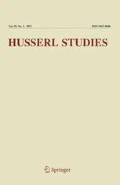Abstract
The major part of this paper is devoted to the task of showing that Husserl's account of knowledge and truth in terms of a synthesis of fulfilment falls prey neither to a form of “metaphysics of presence” nor to a “myth of interiority” or mentalism. Husserl's presentation of the desire to know, his awareness of irreducible forms of absence at the heart of the intuitive presence of the object of knowledge and his formulation of general rules concerning the possible accomplishment of a synthesis of fulfilment are therefore carefully examined. Special attention is also given to the fact that the determination of knowledge and truth provided by the Sixth Logical Investigation rests on an account of an original interweaving between the thing, consciousness, and language. Unlike in Husserl's earlier and later works, no attempt is thereby made to subordinate any of these three elements involved in all knowledge to one of the others.
Similar content being viewed by others
Author information
Authors and Affiliations
Rights and permissions
About this article
Cite this article
Bernet, R. Desiring to Know through Intuition. Husserl Studies 19, 153–166 (2003). https://doi.org/10.1023/A:1024896132644
Issue Date:
DOI: https://doi.org/10.1023/A:1024896132644



